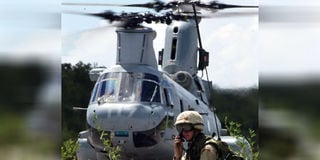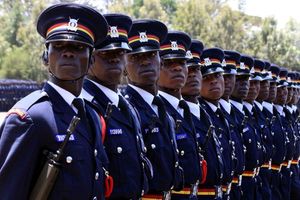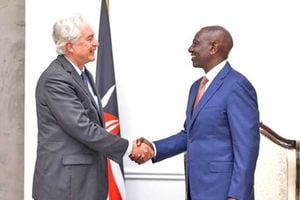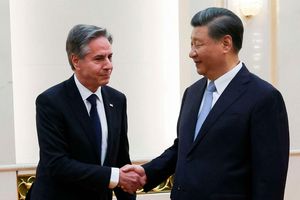
A US marine coordinates the landing of a US CH46 Bullfrog helicopter during joint exercises between the Kenyan and the US army in Manda Bay.
In what appears to be a resetting of the Cold War, world military powers are involved in a struggle for a stake in the ports along the eastern seaboard of Africa. At the centre of what can easily pass as militarisation of the region, Kenya has elicited renewed interest from the United States, which plans to expand its presence at Manda Bay naval base in Lamu, under the jurisdiction of the Kenya Defence Forces.
Security experts say the renewed interest in Kenya by the US follows the growing influence of the Chinese and Russians, whose clout transcends military and economic interests and poses a threat to countries that coalesce under the North Atlantic Treaty Organisation and are sympathetic to Israel and Ukraine.
Since Russia launched a large scale attack on neighbouring Ukraine in February 2022 and the ongoing Israeli onslaught on Gaza that began on October 7, 2023, there have been fears of an imminent global conflict, hence the high military presence in the Red Sea and the Suez Canal.
The situation is complicated by the emergence of Syrian dissidents attacking cargo ships in the Red Sea and Suez Canal. The ships being attacked are owned by companies in countries allied to Israel.
Former head of security at parliament, Solomon Obange, says the scramble for the eastern seaboard of Africa should not come as a surprise.
Dr Obange says ongoing conflicts in the region attract arms manufacturers and suppliers.
He, however, notes that strategic interests that include natural resources, maritime trade, markets and ideological inclinations are driving the scramble for eastern Africa by the US, China, Russia, Turkiye, Israel and France.
The US Africa Command (Africom) is stationed in Djibouti, a country that also hosts French and Chinese naval bases.
Russia and Iran are in talks with factions in the Sudanese conflict to establish naval bases in Port Sudan, while Ethiopia – believed to be a proxy – has signed an agreement with semi-autonomous Somaliland, a deal disputed by Mogadishu.
The US and Turkiye announced at the start of this year that they would help Somalia build its military as the Mogadishu regime prepares for life after the exit of the African Union Transition Mission in Somalia (Atmis), which ends in nine months.
“Militarisation in the Horn of Africa is arguably a result of post-colonial and post-Cold War inordinate rivalry of global powers. World and regional powers that are opening military bases and naval fleets in the Horn have the aim of countering security threats (terrorism, piracy and ocean armed robbery), security trade routes, projecting military and diplomatic capability and winning friendly regimes,” states Good Governances Africa.
Research findings by Fekade Terefe Mulugeta Tesfaye titled Militarisation of the Horn of Africa and What this Means for Regional Security, note that eastern Africa is synonymous with conflicts between states, secessionist movements, inter-state violent disagreements, foreign interventions, terrorist attacks, piracy and violence after contested elections.
It is, therefore, ideal for an arms trade which manufacturers and sellers are keen to take advantage of.
“In a fashionable manner, most governments in the region were former rebels (Eritrea, South Sudan, Ethiopia and Somalia) in their respective countries where narrow domestic political space stimulates another round of insurgents. There are also looming conflicts that stem from failed states and countries with unstable transitions. The failure of Somalia and South Sudan, the swinging impasse between Ethiopia and Eritrea, unsettled problems between Eritrea and Djibouti, Ethiopia and Sudan and ongoing internal violent conflicts in South Sudan and Ethiopia cause security vulnerability in the region,” the study says.
Former US Marine Franklin Andrew says the turmoil in the Middle East and the presence of Russian mercenaries in west and central Africa make Kenya an ideal American outpost to check the Wagner Group.
Wagner has been fighting alongside the Rapid Support Forces, blamed for atrocities visited on civilians in Darfur, Sudan.
“Kenya is the only country in eastern Africa that has not had internal conflict (despite frequent ethnic tensions), save for banditry and cattle rustling. The rest of the countries – except Tanzania – are at war, which makes it easy for terrorist groups like the Islamic State, al-Qaeda and al-Shabaab to infiltrate,” Andrew says.
He explains further that eastern African has become a hub of international organised crimes like human trafficking, narcotics trade and illicit natural resources trafficking.
“However, the strategic interests of the US are at play in the militarisation of the region,” he adds.
“President William Ruto’s invitation to the US is intended to give Washington the carte blanche to use Manda Bay base and other facilities like Wajir and Nanyuki. Ruto is a much more attractive person than the other heads of state in eastern Africa. Remember, China has a base in Djibouti, ‘from where they shoot at American planes’. If the US were to go to war with China over Taiwan, it’d be a global war and China would start attacking US assets in the Atlantic Ocean because it has bases in Equatorial Guinea and Djibouti. China wants to reach all places with problems. The US is responding to this ambitious military programme by bolstering its presence in eastern Africa, with Kenya as the launchpad.”
The explanation ties in with Dr Obange’s perspective that the Suez Canal and the Red Sea are critical pathways for trade and global security.
“The Suez Canal and the Red Sea are not under the control of superpowers. None of the superpowers will allow the others to dominate. Thus, the Red Sea and the entire eastern seaboard of Africa are good for strategic response when there’s power play. Mombasa, for instance, is a natural port and attracts many international naval ships. The suitability of the entire Kenyan coastline is attractive to superpowers,” Dr Obange says.
Kenyan and American officials were not available for comment when contacted for a response.
However, according to Terefe and Tesfaye, the proliferation of foreign militaries, especially along the eastern coast of Africa, is informed by the presence natural resources.
The two note that France has had naval bases and garrisons in Djibouti (Chabelley Airfield, Lemonier and Ambouli) from the time of the protectorate rule while the United Kingdom has military bases in Nanyuki, Kenya, and Somalia dating back from the colonial times.
China’s decision to have a base in Djibouti was as a result of the stalemate between Beijing and Washington over Taiwan, which China claims.
“Despite the presence of France for a long time, the influx of foreign military bases and naval activities boomed after China established a military base in Djibouti in 2008,” Terefe and Tesfaye say.
“Since then, the edges of Bab-el-Mandeb have attracted foreign military intrusion – from world to regional powers – thus crowded the spatial strife with airfields, military logistics centres and facilities, war fleets, training sites and ocean patrols.”
Israel, has long had a military presence in Massawa, Ambba Sawara and Dahlak in Eritrea that it uses to watch and monitor Iranian activities.
Egypt, which has had historical tensions with Israel, has had a presence in Port Safaga, Eritrea, since 2017 from where it supports its allies in the ongoing Yemen civil war.
Turkiye established bases in 2009 and built its largest oversea military facility in Mogadishu in 2017.
In those bases, Turkiye trained Somali military personnel and patrolled the ocean to counter piracy.
“Turkiye also has bases in Sawakin, Sudan. These bases help project Ankara’s diplomat power in the region and counter Egypt’s involvement in Libya,” the Ethiopian scholars, Terefe and Tesfaye, say.













